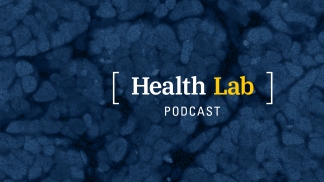The growing use of hemp-derived alternative cannabis products containing CBD, Delta-8-THC, CBG, CBN
5:00 AM
A lack of regulation around CBD, Delta-8 and other cannabinoids could open up consumers to harm. Visit Health Lab to read the full story.
Transcript
Host:
Welcome to Health Lab by Michigan Medicine, your destination for news and stories about the future of healthcare. Today: Growing use of hemp-derived alternative cannabis products containing CBD, Delta-8-THC, CBG, CBN.
Cannabis use for medicinal or recreational purposes is now permitted in most states in the United States.
Many of the products sold in dispensaries contain delta-9-tetrahydrocannabinol (better known as “THC”), and are thus classified as Schedule I drugs, making them illegal under federal law.
However, there is a parallel market for products derived from hemp—defined as cannabis containing less that 0.3% THC—spurred in part by the passage of the 2018 Farm Bill, which removed hemp-derived cannabinoids from the federal Controlled Substances Act.
A U of M study published in JAMA Network Open examines past-year use of some of these hemp-derived cannabinoids, including cannabidiol or CBD, Delta 8-THC, cannabigerol or CBG and cannabinol or CBN.
Says Dr. Kevin Boehnke, of the U of M Chronic Pain and Fatigue Research Center, “While the de-scheduling of hemp products initially opened up the market for CBD products, it also applies to the 100-plus cannabinoids also found in the plant.
“That means, as with CBD, all of them can follow that same path and be sold in gas stations, as ingredients in cosmetics, as well as in dispensaries—there will likely be substantial proliferation of some of these compounds.” Dr. Boehnke is with the Department of Anesthesiology at the University of Michigan Medical School.
Using a census-representative sample of adults from the National Opinion Research Center AmeriSpeak panel, Boehnke and his colleagues examined knowledge of and past-year use of the most popular hemp derived cannabinoids.
Overall, 72% of participants had heard of CBD, while fewer had heard of delta-8-THC (41%), CBG (18%), or CBN (17%).
Similarly, 21% reported using CBD in the past year, compared with 12% for delta-8-THC, 5% for CBG and 4% for CBN.
Furthermore, people living in states without legal medical or recreational cannabis laws had higher rates of using delta-8-THC.
“Delta-8-THC purportedly has quite similar effects to delta-9-THC, better known as THC. In other words, there is a loophole where people in states without legal cannabis can get high legally on delta-8-THC.
“It makes sense then that people who don’t have access to regulated markets would be more likely to use it,” said Boehnke.
However, use of these alternative cannabinoids is concerning, says Boehnke, because these products are largely unregulated and have inadequate safety testing for contaminants like pesticides and solvents.
Further, many may not contain the amounts listed on the label.
“Not only are people with medical conditions being sold products with uncertain therapeutic effects, but these products may contain contaminants that are harmful,” said Boehnke.
He adds that without a basic framework ensuring adequate laboratory testing for safety, alternative cannabinoid products could be putting people, especially young people, at risk.
For more on this story and for others like it, visit michiganmedicine.org/health-lab. And subscribe to the Health Lab podcast wherever you listen to your favorite shows.

Listen to more Health Lab podcasts - a part of the Michigan Medicine Podcast Network.





